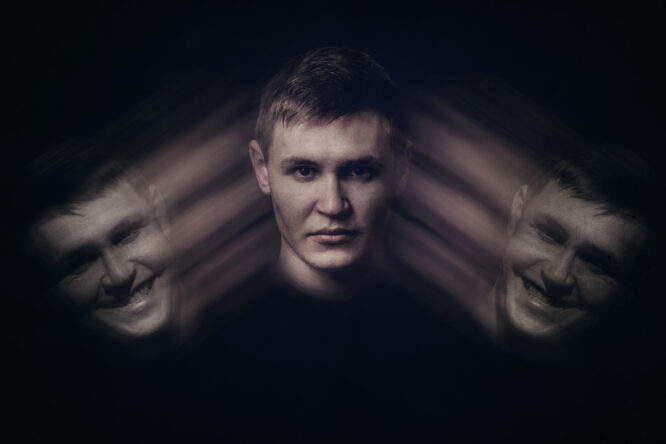Dissociation has become the stuff of memes, with social media users joking about using it to detach from the terrible things happening in the world around them.

However, this practice is more than just zoning out. Sometimes, it’s much more subtle (and serious), showing up in ways that people don’t even realise are signs of disconnection. It can feel like being on autopilot, struggling to connect with emotions, or even losing track of time in a way that feels unsettling. Because it isn’t always dramatic, many people experience it without recognising what’s actually happening. Here are just some of the signs you might be experiencing dissociation that you might not expect. If you’re struggling, don’t hesitate to reach out to a friend, family member, GP, or therapist to get help.
1. Feeling like life is happening, but not really feeling part of it

One of the most common but overlooked signs of dissociation is feeling like you’re just going through the motions. You show up to work, have conversations, and do everything you’re supposed to, but it all feels distant, like you’re watching yourself rather than fully experiencing things. It’s not necessarily sadness or numbness, but a strange feeling of being removed from your own life. People often brush this off as stress or exhaustion, but when it happens regularly, it’s a sign that the brain is disconnecting as a way to cope. It can feel like you’re living on autopilot, reacting to things rather than fully engaging with them. The more it happens, the harder it becomes to feel present in your own experiences.
2. Struggling to remember the details of your day

It’s normal to forget small things now and then, but when dissociation is involved, gaps in memory happen more frequently. You might finish your day and realise you can’t recall much of what happened, even though you were technically there for all of it. It’s like your mind was present enough to function, but not enough to actually register events in a meaningful way. Sometimes, this feels like time slipping away without explanation—whole conversations, tasks, or moments becoming hazy or completely blank. It’s not a memory issue in the usual sense, but rather a sign that your brain wasn’t fully engaged. The more frequently this happens, the harder it becomes to feel connected to your own timeline.
3. Feeling emotionally detached from things that should matter

When dissociation is present, emotions don’t always match what’s happening around you. You might know something is supposed to make you happy, sad, or excited, but the feeling just isn’t there. Instead of reacting emotionally, you feel distant, even when something objectively important is happening. It’s not because you’re cold or indifferent; it’s the brain’s way of shutting down overwhelming feelings before they even surface. After a while, this can lead to feeling disconnected from relationships, hobbies, or even personal achievements. It’s frustrating when you know you should care, but it feels like there’s a barrier between you and your emotions.
4. Losing track of time without realising it

Most people have moments where time seems to speed up or slow down, but dissociation takes this to another level. You might look at the clock and suddenly realise hours have passed, but you have no clear sense of what you were doing during that time. It’s more than just being distracted; it’s a deeper feeling of disconnect. These time gaps often feel disorienting, like parts of the day just slipped away. You might complete tasks, have conversations, or even drive somewhere without any real memory of doing so. It’s as if your brain was on autopilot, handling things while your awareness was elsewhere.
5. Feeling like you’re watching yourself from the outside

Some people describe dissociation as feeling like they’re watching their own life like a movie. You’re there, but it doesn’t feel like you’re fully inside your own body or experiences. It’s an odd sense of detachment, as if you’re observing yourself rather than being fully involved in what’s happening. The experience can be unsettling, especially when it happens suddenly. You might feel like your actions don’t fully belong to you, or that there’s a slight disconnect between your thoughts and what you’re doing. It’s a way the brain distances itself when things feel overwhelming or too much to process.
6. Finding it hard to connect with your own reflection

Looking in the mirror and feeling like the person staring back isn’t quite “you” is a subtle but significant sign of dissociation. It’s not necessarily about disliking your appearance; it’s more about feeling like there’s a gap between your physical self and your internal identity. You recognise yourself, but something feels… off. That disconnect can range from mild to deeply unsettling. Some people feel like they’re looking at a stranger, while others just have a moment of weird unfamiliarity. It’s another way the brain creates distance from reality when emotions or stress become too much.
7. Reacting to situations more with logic than emotion

While being rational is a good thing, dissociation can make emotions feel so distant that you rely purely on logic, even in deeply personal situations. Instead of feeling joy, sadness, or excitement, you analyse things as if they’re happening to someone else. Everything becomes about what “makes sense” rather than how it actually feels. It can make relationships tricky because people might expect an emotional response that you struggle to give. It’s not that you don’t care—it’s that the connection to those feelings feels muted. When this becomes a habit, it can make it harder to process emotions, even when you want to.
8. Feeling numb in stressful situations instead of overwhelmed

When most people face stress, they feel anxious, frustrated, or overwhelmed. But dissociation often replaces those feelings with numbness, making it seem like nothing affects you at all. You know the situation should be stressful, but instead of reacting, you just feel blank. At first, this can feel like a strange superpower — being “calm” when everyone else is panicking. But after a while, it becomes frustrating when you realise you’re not actually processing what’s happening. It’s a defence mechanism, but one that can make it harder to deal with emotions when they finally catch up to you.
9. Struggling to recall specific details from your past

People with dissociation often find that certain memories feel distant or blurred, even if they weren’t particularly traumatic. They haven’t forgotten everything; it’s more like looking back on events as if they happened to someone else. The emotions attached to past experiences feel weak or entirely missing. It can make nostalgia feel strange, as you struggle to fully connect with memories that other people seem to remember with strong feelings. While the facts are there, the emotional connection isn’t. It’s another way the brain tries to manage emotions by creating distance.
10. Avoiding deep emotional conversations

When dissociation is present, deep emotional conversations can feel overwhelming or completely uninteresting. You might struggle to find the right words to express how you feel, or you may just shut down entirely. It’s not that you don’t want to connect, it’s that emotions feel too distant to articulate. Other people might see this as being closed off or emotionally unavailable. But internally, it’s more about not knowing how to bridge the gap between what you know and what you feel. The more detached you become, the harder these conversations feel.
11. Feeling drained after socialising, even with close friends

For people dealing with dissociation, socialising, even with people they love, can feel exhausting. Engaging in conversation, responding appropriately, and keeping up with emotional cues takes effort. Even if you enjoy the company, it can leave you feeling mentally drained. This isn’t necessarily introversion; it’s more about the mental effort it takes to stay present when part of your mind is disconnected. You might find yourself needing time alone to reset, even if you weren’t outwardly stressed. It’s another sign that your brain is working overtime to stay engaged.
12. Over-relying on distractions to avoid feeling disconnected.

When dissociation is a regular part of life, distractions become a coping mechanism. You might realise you’re constantly scrolling through social media, binge-watching TV shows, or keeping yourself busy just to avoid the unsettling feeling of detachment. You might not even enjoy doing these things, but they keep your mind occupied so you don’t have to deal with the emptiness. At first, distractions can seem like a harmless escape, but over time, they can prevent real emotional processing. The more you rely on them, the harder it becomes to sit with your thoughts or feelings. While short-term distractions can be helpful, they shouldn’t become the only way you cope with dissociation.
13. Feeling like nothing really excites or interests you anymore

One of the most overlooked signs of dissociation is a slow loss of interest in things you once enjoyed. It’s not the same as depression, where sadness takes over; it’s more of a quiet disconnection, where everything starts to feel neutral. Even activities, hobbies, or events that used to bring excitement now feel distant and unimportant. That emotional flatness can make life feel like it’s on autopilot, where everything just happens but doesn’t truly matter. You might force yourself to engage in things out of habit, but the emotional connection is missing. Recognising this shift is important because it’s often a sign that dissociation is becoming a long-term coping mechanism rather than just a passing phase.




